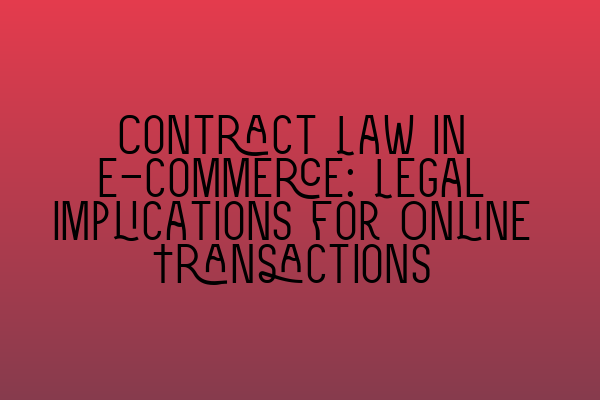Contract Law in E-commerce: Legal Implications for Online Transactions
With the rapid growth of e-commerce in recent years, online transactions have become the norm for many businesses. However, this shift in the way we conduct business raises important legal questions. Contracts, which play a crucial role in defining the rights and obligations of parties involved, must be carefully crafted and executed to ensure enforceability.
In this blog post, we will explore the legal implications of contract law in the realm of e-commerce. We will delve into the key considerations for businesses engaging in online transactions and provide insights to help navigate the legal landscape.
1. Offer and Acceptance
One of the fundamental elements of a valid contract is the concept of offer and acceptance. In e-commerce, the challenge arises in determining when and where the offer and acceptance occur in the online environment.
An offer can be made through a website, email, or even through a chatbot. It is essential to ensure that the offer is clear, specific, and includes all necessary terms and conditions.
Acceptance, on the other hand, can be manifested by clicking an “I agree” button, adding items to a shopping cart, or making a payment. The timing and method of acceptance should be clearly communicated to avoid any disputes.
2. Electronic Signatures
When it comes to e-commerce, the traditional concept of physically signing a contract may not be feasible. Electronic signatures have gained recognition as legally valid signatures in many jurisdictions. However, it is important to ensure that the electronic signature used meets the requirements set forth by applicable laws.
Using secure digital signature technology can help ensure authenticity and integrity of the agreements. Additionally, implementing robust authentication measures can prevent unauthorized access and protect against fraudulent activities.
3. Online Terms and Conditions
Online terms and conditions, often presented as clickwrap or browsewrap agreements, form an integral part of e-commerce contracts. These agreements set out the rights and responsibilities of both parties and clarify important aspects such as payment terms, delivery, and dispute resolution.
When drafting online terms and conditions, it is crucial to ensure they are easily accessible, clearly worded, and prominently displayed on the website. Incorporate mechanisms to obtain users’ express acceptance, such as checkbox acknowledgments or pop-up notifications.
4. Consumer Protection
E-commerce transactions often involve consumers, who enjoy specific protections under the law. Consumer protection regulations necessitate the inclusion of certain provisions, such as the right to cancel within a specified period and clear information on product warranties.
Businesses should proactively comply with these requirements to avoid legal repercussions. Displaying clear and accurate product descriptions, providing detailed information about return policies, and handling consumer complaints promptly are essential steps to ensure a positive customer experience.
5. Jurisdiction and Governing Law
E-commerce businesses must carefully consider the jurisdiction and governing law applicable to their transactions. Determining which laws apply can have significant implications on issues such as taxation, consumer rights, and dispute resolution.
In cases where businesses operate internationally, specifying the applicable law and jurisdiction in the contract can help clarify the parties’ intentions and provide a roadmap for resolving potential disputes.
6. Data Protection and Privacy
Data protection and privacy have become hot topics, with new regulations introduced to safeguard individuals’ personal information. E-commerce businesses must adhere to these regulations to protect customer data and maintain trust.
Implementing robust security measures, obtaining appropriate consent for data collection and usage, and maintaining transparency in data handling practices are essential to comply with data protection laws and prevent data breaches.
Conclusion
In the ever-evolving world of e-commerce, understanding the legal implications of contract law is essential for businesses to thrive while managing risk effectively. Consistently ensuring clarity, authenticity, and compliance with applicable laws will not only protect businesses from legal disputes but also earn the trust and confidence of consumers.
By carefully crafting contracts, implementing secure electronic signature technology, and remaining vigilant in terms of consumer protection and data privacy, e-commerce businesses can create a solid foundation for success in the digital marketplace.
